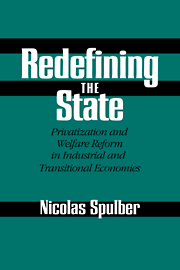Book contents
- Frontmatter
- Contents
- List of Figures and Tables
- Preface
- Part I Rationale for the State's Expansion
- Part II Methods of Remodeling the State
- Part III Comparisons Within Broader Frameworks
- 5 Options and Outcomes in the Industrial Economies
- 6 Options and Outcomes in the Transitional Economies
- Part IV Outlook for the Twenty-first Century
- Notes
- Index
5 - Options and Outcomes in the Industrial Economies
Published online by Cambridge University Press: 29 March 2010
- Frontmatter
- Contents
- List of Figures and Tables
- Preface
- Part I Rationale for the State's Expansion
- Part II Methods of Remodeling the State
- Part III Comparisons Within Broader Frameworks
- 5 Options and Outcomes in the Industrial Economies
- 6 Options and Outcomes in the Transitional Economies
- Part IV Outlook for the Twenty-first Century
- Notes
- Index
Summary
Privatization, Welfare, and the State's Agenda
As I pointed out in Chapter 3, the political and ideological upheaval brought about by Margaret Thatcher in Britain and by Ronald Reagan in the United States in the late 1970s and early 1980s aimed at liquidating the so-called postwar settlement in the first country and the Roosevelt era consensus, in the second – both viewed as embodying the ideas of activist governments preoccupied with full employment and the welfare state. The new leaders intended to redefine the role of the state, reduce its functions, and bring to an end what they perceived as the era of overcentralized, bureaucratic, and interventionist governments. Margaret Thatcher directed her attack in particular against public ownership, that is, against Labour's nationalizations and Labour municipalities' extensive power, ownership, and control. Accordingly, privatization there became a key instrument for remodeling both the state and the power relations in society. In the United States, Reagan's emphases on increased defense spending (because of the Soviet menace), along with large tax cuts, decreased welfare spending, and an eventual balanced budget – the whole denounced as “voodoo economics” by his electoral competitor and eventual partner George Bush – also aimed at redefining the scope of the state. Tax cuts – with taxes viewed as evil – and decreased income transfers became Reagan's instruments for downsizing the state and limiting its functions. The same emphases were repeated by the Republicans during and after their successful parliamentary elections of 1994. Some of their leaders reasserted Reagan's creed that taxes were not only evil but also unnecessary.
- Type
- Chapter
- Information
- Redefining the StatePrivatization and Welfare Reform in Industrial and Transitional Economies, pp. 135 - 161Publisher: Cambridge University PressPrint publication year: 1997



